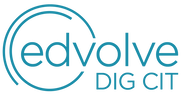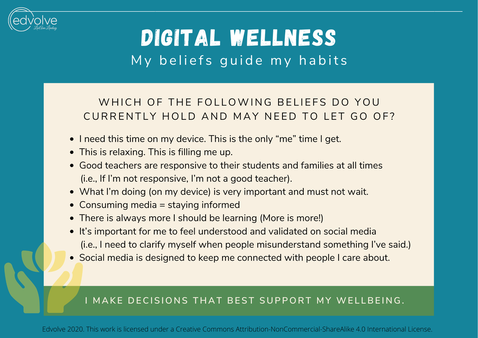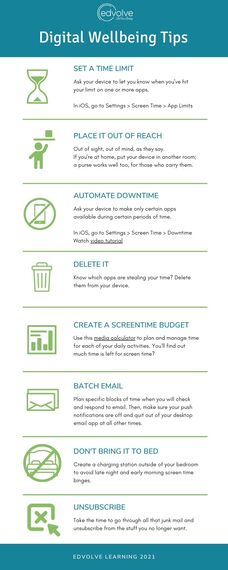|
It makes sense that digital wellbeing tips and tricks have been circulating the edu-web at a higher frequency lately, as most of us are eager for any tip, trick, or magic potion to help us achieve more of it. Tips and Tricks vs. Beliefs Tips can be great when they offer something that is specific to the goal we want to achieve. For example, when I realized that most of the time I spent on social media consisted of mindless scrolling, I followed a tip to set an automatic daily time limit on Instagram. Now the app kicks me out when my 15 minutes are up. It works! But tips and tricks may not be as effective when we hold underlying beliefs that justify our existing technology habits. What I mean is… If we believe that being available and responsive at all times is what makes us successful at work, a tip about batch emailing probably won’t curb our obsession with checking email or DMs. If we believe that constant news consumption makes us more informed, we might just be driven to an unhealthy media diet that even the best tip won't change. 7 Beliefs Statements to Consider Before you dive into another digital wellness tips and tricks list, take a moment to reflect on the following 7 beliefs -- and ask yourself whether any resonate, and might be promoting unhealthy digital habits in your own life. 1. I need mindless activity to relax. This is the only “me” time I get. If you believe this, you might be choosing mindless scrolling over more healthful “me time” activities. Resource: 15 Things to Do Instead of Scrolling Mindlessly Through Facebook 2. Good teachers are responsive to their students and families at all times If you believe this, you might be answering emails at all hours...or feeling guilty if you’re not. << both impede wellness. 3. What I’m doing (on my device) is very important and must not wait If you believe this, you might be ineffectively prioritizing your time and activities. 4. Consuming media = staying informed If you believe this, you might be consuming far more media than is healthy. This may also impact your mood and emotional state, depending on the content of the news/media being consumed. Resource: The Art of Being Well Informed 5. I should learn all of the best technology tools for my class If you believe this, you might be in total burnout mode from over-consumption. 6. It’s important to be understood and validated; I need to clarify myself when people misunderstand something I’ve said If you believe this, you might be spending a lot of time and emotional energy posting and responding on social media. Resource: Being Misunderstood is Painful 7. Apps are designed to connect us with friends and provide lighthearted entertainment If you believe this, you might be overlooking signs of tech obsession. You might also be giving tech companies more personal data than you'd really want to. When you identify a belief that keeps you locked in to a behavior, you're better equipped to notice those thoughts as they emerge... and thus, you may just find it easier to make different decisions! Once again teachers, thank you for all you do, today and always. Please take care and be well! Cheers, LeeAnn I created this simple graphic with the belief statements. And if what you really need is just a few tips, check these out. I’m not a psychologist or behavior expert, though wellness has long been an area of interest and study. I’ve also been actively investigating what it means to be well with technology, and to encourage healthy digital citizens.
2 Comments
Kim L Thomas
2/16/2021 06:44:57 pm
Ok, time to rethink “digital consumption”!
Reply
LeeAnn Lindsey
2/19/2021 05:39:05 pm
Kim, here is an interesting read that caused me to re-think digital consumption. It's from 2018 but I found it to be very relevant today. https://theoutline.com/post/6447/ethics-in-news-consumption
Reply
Leave a Reply. |
AuthorI care deeply about helping educators cultivate healthy environments where every student and teacher can learn, grow, and thrive in this digital world! |






 RSS Feed
RSS Feed
